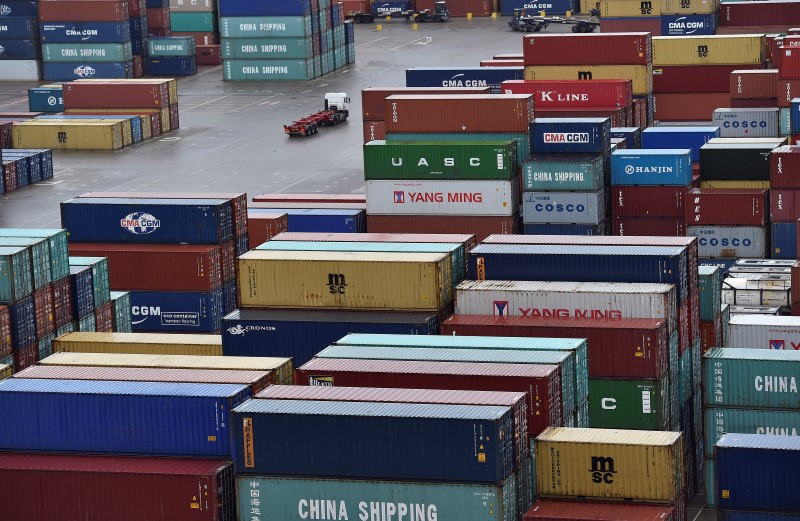LONDON (Reuters) - Britain's trade deficit with the rest of the world narrowed in the three months to September, offering a boost to third-quarter growth, after a hefty fall in sterling following Britain's vote to leave the European Union.
However, the trade deficit in goods heavily overshot economists' expectations in September alone, driven in part by a record deficit with the EU, and the ONS said there was little direct evidence so far of currency effects on trade.
The Office for National Statistics said Britain's total trade deficit narrowed to 11.0 billion pounds in the third quarter from 12.7 billion pounds in the April-June period, which was the highest since the end of 2013.
The deficit in goods alone narrowed to 33.2 billion pounds in the third quarter, but for September it widened to 12.7 billion pounds, above all forecasts in a Reuters poll.
August's estimate of the goods trade deficit was revised to 11.1 billion from 12.1 billion.
Britain's currency dropped more than 10 percent against the dollar and the euro after June's referendum, hitting a 31-year low against the dollar, and lost further ground in October to hit its weakest-ever level against a basket of major currencies.
Many manufacturers have reported a jump in foreign demand after the currency fell, but it can take time for this to show up in trade data. Higher costs for imports are often felt first when a country's currency falls, causing the trade deficit to widen temporarily before narrowing.
"So far there is little evidence in the data of the lower pound feeding through into trade volume or prices," ONS statistician Hannah Finselbach said.
In the medium term, there is also uncertainty about how much access firms will have to EU goods and services markets after it leaves the bloc.
Some supporters of Britain leaving the EU have said that Britain's large trade deficit with the bloc will help ensure a favourable deal. They may draw comfort from figures showing that in September, Britain's goods trade deficit with the bloc hit a record 8.7 billion pounds.
Britain's economy slowed much less than most economists had expected in the three months to September, with signs that it was supported by continued robust consumer spending.
Official figures on what types of spending contributed to growth are not due until Nov. 25, but the ONS said Wednesday's data suggested net trade gave a small boost to growth, in contrast to the drag it has generally been in recent years.
Goods export volumes in the third quarter grew by 1.8 percent after a 1.2 percent fall in the previous quarter, while import volumes slipped 0.3 percent, their first fall since Q2 2015.
The Bank of England said last week it expected the fall in sterling to help narrow Britain's big current account deficit, which hit a record high in 2015.
This narrowing may come more through a lower volume of imports than higher exports, however.
The BoE forecast growth in total export volumes will slow from 2.75 percent this year to just 1 percent in 2019, the year the government wants Britain to leave the EU. Import volumes are seen contracting at an annual rate of 1 percent in 2019 after growth of 3.25 percent in 2016.
